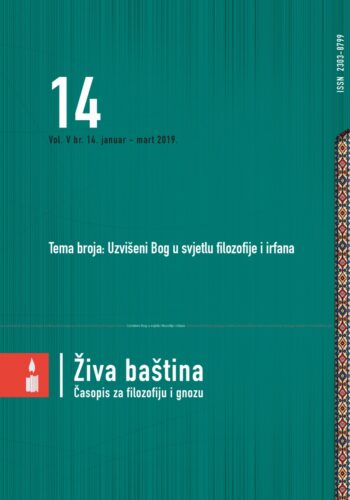UDK 28-13
28-183.5
Predaja “Ko spozna sebe spoznao je svoga Gospodara” spada u red veoma poznatih islamskih predaja, koja je stoljećima zbog svog značaja okupirala umove muslimanskih mislilaca iz svih područja znanosti, kakve su filozofija, irfan, tefsir, hadis, a posebno irfan. Ova predaja je toliko važna da po svom sadržaju predstavlja kamen temeljac puta spoznaje.
Cilj ovog rada je da ponudi prikaz i odgovor na neka od najvažnijih pitanja koja se prirodno nameću kad je riječ o ovoj predaji. Neka od tih pitanja su:
Kakav je nužni odnos spoznaje duše sa spoznajom Boga?
Koja vrsta spoznaje duše dovodi do spoznaje Boga?
Kako nas spoznaja duše dovodi do spoznaje Boga?
Također, rad daje kratak odgovor na mišljenje da ova predaja ustvari želi reći da je spoznaja Boga nemoguća, a u nastavku rada prezentirani su neki od najvažnijih pojašnjenja odnosa spoznaje duše i spoznaje Uzvišenog Boga u svjetlu filozofije i irfana.
The tradition “He who knows himself knows his Lord” from the perspective of Philosophy and Gnosis
Abstract
The tradition “He who knows himself knows his Lord” is one of the well-known Islamic traditions, which, given its significance, has been occupying the minds of Muslim thinkers from all the fields of science, such as philosophy, gnosis, exegeses, hadith, but especially gnosis, for centuries. This tradition is so important that, with its content, it represents the cornerstone of the path of cognition.
This paper aims to present an overview and answer to some of the most important questions which are naturally posed concerning this tradition. Some of these questions are as follows: What is the necessary relation between the cognition of oneself and the cognition of God? Which kind of the cognition of oneself leads to the cognition of God? How does the cognition of oneself lead us to the cognition of God?
The paper also provides a short answer to the opinion of some scholars, according to whom this tradition aims to claim that the cognition of God is impossible. Furthermore, the paper presents some of the most important explanations of the relation between the cognition of oneself and the cognition of God the Exalted in the light of philosophy and gnosis.
Keywords: the cognition of oneself, the cognition of God, the argument of the cognition of oneself
[tags]

